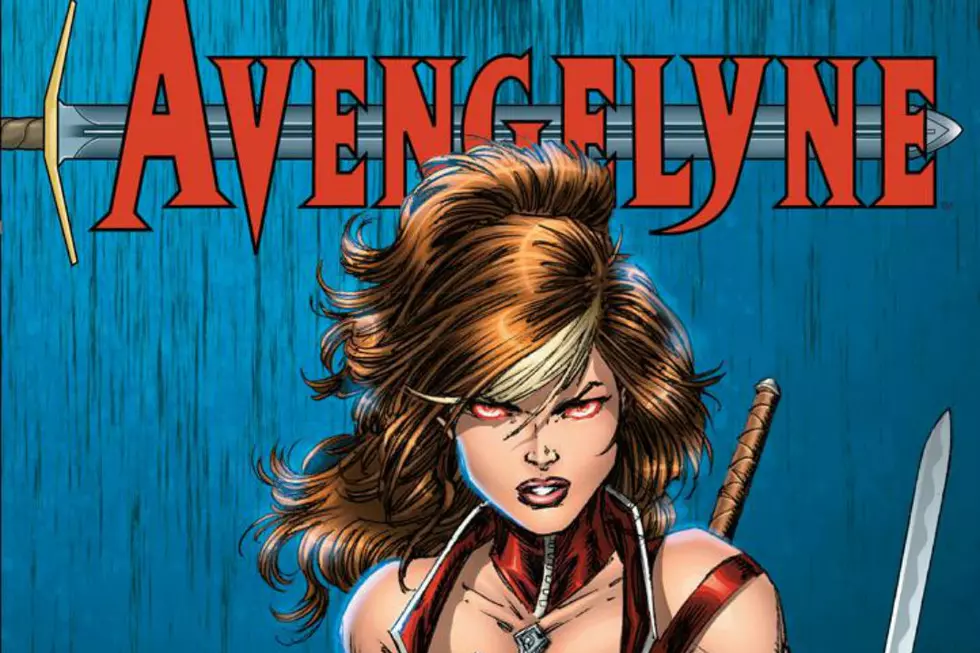
Rob Liefeld is Right: How To Deal With Haters

It's not a stretch to say that Rob Liefeld is probably the most vocally criticized creator in comics. There are countless posts on the internet bashing the work he's done in his 24-year career in comics, and in certain circles, the man's very name is synonymous with bad art and an era of success that almost tanked the entire industry with an illusion of success based on "scarcity" and the idea of comics as "collectibles" rather than as stories.
But the one voice that's been largely absent from discussion of Liefeld has been his own -- until last month, when he wrote an extensive post on his blog about how he's dealt with two decades of hate from everyone from editors to fans. And as it turns out, the Rob's advice is pretty similar to Jay-Z's: Brush your shoulders off.I'll be the first to admit that an awful lot of the criticism directed at Liefeld and his work are perfectly valid, and when you get right down to it, a lot of the things he says in his response feel really disingenuous. At one point, he talks about disbelief that people could be that mad about comics:
I'll admit that I was a little taken back by the severity of the vitriol. Over lines on paper? Over pencils and ink?
I understand what he's getting at here. Online "discussion" in general tends to provoke extreme reactions from big-talking "fans" who revel in melodrama. I worked in a comic book store long enough to know that the type of comic book collector depicted in Our Valued Customers isn't exactly isolated:

The fact that there are people out there who want to physically attack you for the way you drew Wolverine's claws -- or at least that say they want to do so so they can look tough on a message board -- can be shocking and disheartening. At the same time, the defense of "it's just lines on paper" is an incredibly disappointing response. The old shield of "well it's only comics" (or cartoons, or movies, or pop music, or any other creative field) isn't just dismissive, it also says a lot about the person who uses it. If you don't think comics are worth something, if they can't be more than pencils or ink, then why should we?
It's an especially flawed bit of logic when Liefeld moves into talking about his sales figures:
I was given a chance to re-haul New Mutants and take it from the dog of the X-Men office to 1 million copies with its final issue. From there X-Force took flight, we rang the bell at 5 million copies, launched a decade long line of toys and accessories and then I launched the Image age with Youngblood #1 and 1 million copies a month. I knew what it was like to be a darling, a sure thing, guaranteed to move the proverbial needle. Youngblood #1 was my first brush with internet bashing, message boards were just emerging, but the criticism was drowned out by millions of copies flying off shelves.
 Yes, X-Force #1 sold 5 million copies, a number that would cause any comic book publisher today to collapse in a paroxysm of joy, but if it's just "lines on paper" that people shouldn't care so much about, then why does that matter? Especially with the fact that those five million copies definitely didn't go to five million readers, but to a marketplace that was artificially inflated to the point of utter, devastating collapse that saw the company selling those five million copies declare bankruptcy five years later.
Yes, X-Force #1 sold 5 million copies, a number that would cause any comic book publisher today to collapse in a paroxysm of joy, but if it's just "lines on paper" that people shouldn't care so much about, then why does that matter? Especially with the fact that those five million copies definitely didn't go to five million readers, but to a marketplace that was artificially inflated to the point of utter, devastating collapse that saw the company selling those five million copies declare bankruptcy five years later.
But as much as Liefeld was a figurehead for the boom and its collapse -- far more so than contemporaries like Jim Lee, probably because they weren't the ones starring in Levi's commercials about how they and they alone created X-Force --
he wasn't the one who caused it, and the fact that he experienced it the way he did gives him a unique perspective on what it meant to be a success. The fact of the matter is that for all the criticism leveled at his work and for all that he's often considered to be a product of being in the right place at the right time rather than his own skill, The Rob still sells comics. If he didn't, he wouldn't keep getting work.
He still has a dedicated fan-base. He still has fans for whom his work means a lot, even if it's just lines on paper. That's what he's chosen to focus on, and how he endures being one of the most hated men in comics:
You are producing work that is consumed and judged by the public and with today's social media and the 24 blogosphere, you better put on your big boy pants when you go outside. You are going to get poked. At some point, some where the worm will turn, it's not a promise it's a fact. Give me any one of your comic book sacred cows and I'll show you the blog, the thread or the review that tears them a new one. It's all in how you apply your perspective.
[...]
In the late 90′s, the magazine formerly known as the Wizard came after me strong and hard, I was the brunt of jokes for an entire staff of angry fanboys, as much as can be poured on was poured on. But I kept focus as anyone in that situation should. Just because one tribe piles on you, take shelter and continue to work towards your next goal, your next project. Don't be discouraged and remember that there are many fans of your work rooting for you to succeed.
[...]
I was drawing the third issue of a sold out comic book featuring characters that had not carried their own title in 20 years, do I let these attacks get to me? Sorry, I have no time and I have deadlines to meet, and arguing with any of these bloggers would accomplish nothing. DO NOT EVER send a negative comment or engage a negative review, its pointless and takes up valuable time. I advocate moving forward and servicing your fan base.
 Does that mean that you should never listen to criticism, or never attempt to improve? Of course not. But, and I think this is the first time we've said this on ComicsAlliance, Rob Liefeld is right. Keeping criticism in perspective is one of the most important things a creator can learn to do. It also tends to be one of the most difficult: Creative people are often self-critical to the extreme -- it's what drives them to try to improve, and in comics, it's often what drives them to try to improve on the stories that made them fans in the first place -- and as a result, the negative stuff is always going to stick out more than the positive.
Does that mean that you should never listen to criticism, or never attempt to improve? Of course not. But, and I think this is the first time we've said this on ComicsAlliance, Rob Liefeld is right. Keeping criticism in perspective is one of the most important things a creator can learn to do. It also tends to be one of the most difficult: Creative people are often self-critical to the extreme -- it's what drives them to try to improve, and in comics, it's often what drives them to try to improve on the stories that made them fans in the first place -- and as a result, the negative stuff is always going to stick out more than the positive.
Especially when that "negative stuff" comes in the form of the bitterness and anger that comes from those lines on paper meaning an awful lot to people. We see it happen here at ComicsAlliance all the time, on both sides of the equation, both in the things we write because we have strong feelings, and in the reactions we get calling for our violent deaths whenever we make controversial statements like "women are also people."
You're not going to be able to control how people react to something that you do, and you're not going to be able to stop them from reacting negatively. We react negatively to stuff all the time -- it's actually part of our job to review things whether we like them or not. But you can control how you react to it, whether you let it bring you down, inspire you to do better next time, or just brush it off and keep doing what you do for the people who like it.
The entire piece is well worth reading, if only because it's an interesting look at what it's like to actually be Rob Liefeld. We've had our share of fun at the Rob's expense at CA, largely because he always struck us as more of an idea than an actual person. Like I said, his name conjures up so many things beyond just "a guy who draws comic books" that it's often hard to think of him as just that, and it's really fascinating to see what it must be like to have to live with that all the time.
I'm not a fan of Rob Liefeld's art, and I disagree pretty thoroughly with some things he's said in the past, but this isn't one of them. When he's right, he's right.
Laugh at yourself. it's the single most important aspect of surviving this crazy business. And that's from the man that gave Cap boobs.
(via The Beat)
More From ComicsAlliance








![The Science Experiment: How Graham & Roy’s ‘Prophet’ Revival Smashes Expectations [Sci-Fi Week]](http://townsquare.media/site/622/files/2016/09/prophet-featured-2.png?w=980&q=75)
